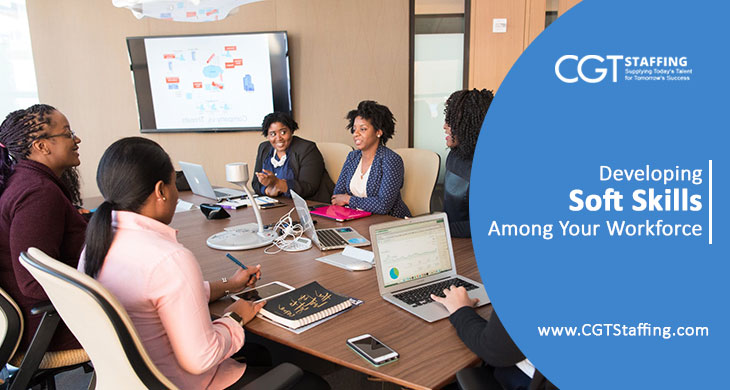Many prospective candidates will likely have the technical skills and expertise needed for the job for which they’re being considered. Soft skills, however, are another matter entirely. The challenge for modern business leaders is to help their teams combine their technical knowledge with their soft skills to optimize their performance and effectiveness.
What do you do if a resource lacks specific soft skills? In the modern workplace, the development of soft skills is of the utmost importance. This blog explores how you can develop them within your own diverse teams and workforces.
Table of Contents
What are Soft Skills?
Soft skills include things like punctuality, organization, adaptability, communication, and critical thinking. These skills are unlike the hard skills candidates acquire over the course of their academic and professional experience.
Soft skills are generally harder to teach. However, they help people navigate the business world successfully. They determine how well a candidate can solve problems and adapt to change in the workplace. These are all very valuable traits that businesses can leverage for better productivity.
Here are just a few ways you can start developing soft skills within your teams:
- Assess Soft Skill Training Needs
- Leverage LMS Tools for the Heavy Lifting
- Include a Mix of Online Learning Tools
- Create Opportunities to Practice Soft Skills
- Hire the Right People from the Start
Let’s take a closer look at these below.
Assess Soft Skill Training Needs
As with any business transformation, unless you know where you are headed, you cannot plan a route to your destination. Any initial steps towards developing soft skills among your team must necessarily start with an assessment of their training needs. To do this effectively, workers need to take an active part in the learning process. Start by asking your team to define their own goals.
Look into the problems they feel they encounter. Whether organizational or communication proficiency, once you know what your team is lacking, you can start creating learning materials and opportunities to close those gaps.
You May Like: Changing Trends in Financial Services Recruiting
Leverage LMS Tools for the Heavy Lifting
An LMS or a Learning Management System is an invaluable tool for the professional learning process. LMS acts as a portal where employees can log in and gain access to learning material. It also serves as a recordkeeper, tracking each employee’s learning progress, and keeping you informed of their progress.
Many learning management systems can even measure individual progress against defined goals for the learning module. The LMS can do all the heavy lifting when it comes to the learning process, leaving your HR executives free to focus on other pressing tasks at hand.
Include a Mix of Online Learning Tools
Many companies now boast a sizeable percentage of millennials within their workforce. Millennials are typically well-informed about technology and feel comfortable using it for their day-to-day needs. If your organization has a significant millennial workforce, you can leverage various eLearning tools to reinforce soft skill development.
Online learning tools appeal more to millennials than printouts and binders. This is in part thanks to the intuitiveness and ease of use that come with eLearning platforms. In many cases, supplementing your LMS with eLearning can be a much better way to inculcate softskills within a younger workforce.
Create Opportunities to Practice Soft Skills
Simply teaching the benefit of soft skills is not enough to affect change. For people to actually learn them, they need to have opportunities and use cases to practice them. You can’t teach your workforce to operate as a team without first refining their ability to communicate and think as one.
You need to ensure that they have sufficient opportunities within the workplace to test out and refine the softskills they are taught. With the ability to apply their soft skills in the workplace, your workforce will become that much more effective at their jobs.
Hire the Right People from the Start
Soft skills are usually harder to teach than hard skills. Technical expertise and knowledge come from years of academic and professional pursuits. Unfortunately, few people receive any training in soft skills while in school, college, or even in the workplace. What’s more, many businesses lack the time and resources to create softskills learning programs for their workers.
That’s why it is so important to hire the right talent from the get-go. Experienced firms like CGT Staffing can help you source optimal candidates with the right mix of hard and soft skills. Staffing solutions not only save on hiring costs, but they also save on employee development costs as well. When the employees you hire already have the soft skills you need, you may not need to teach them much.
